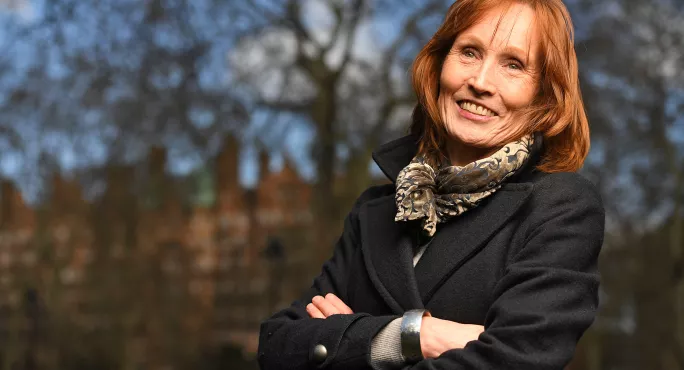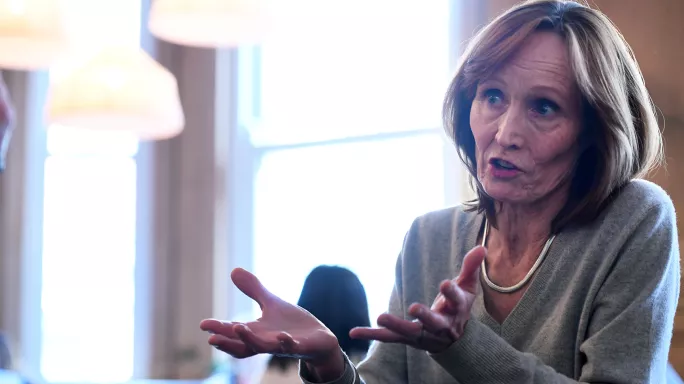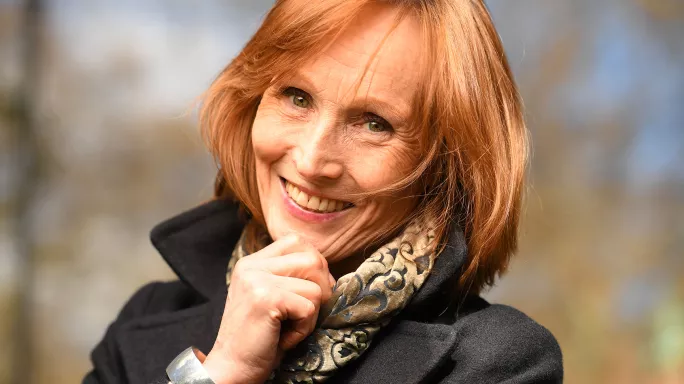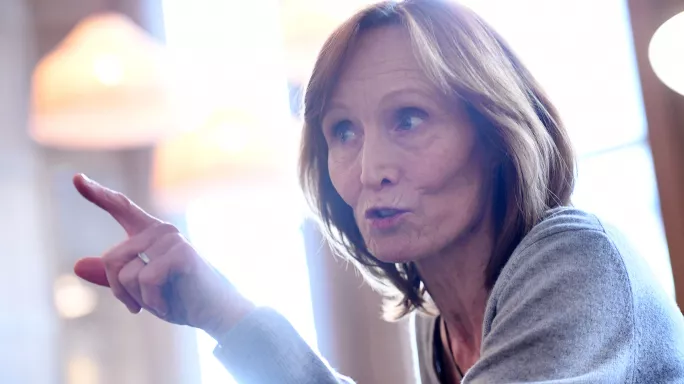- Home
- Switching from private school to a comprehensive ‘saved my life’
Switching from private school to a comprehensive ‘saved my life’

As a young feminist in the 1980s she would go into shops and complain if she thought the window display was sexist.
She joined the peace demonstration at Greenham Common RAF base in protest at nuclear missiles being kept there, and she fundraised for striking miners and marched against Thatcher’s “anti-gay” Section 28 legislation, which prevented teachers from discussing same-sex relationships with pupils.
She was also part of a group who successfully campaigned to have a sex shop closed down.
A generation later, Dr Nuala Burgess has taken on a new cause - as chair of Comprehensive Future, a group campaigning for a “fair and inclusive” admissions system in our schools.
Read: Public backs comprehensives over grammar schools to improve social mobility
Tes community: on private schools v comprehensives
Read: ‘Ballots would make school admissions fairer’
It’s a campaign not just against the country’s 163 grammar schools, but also against the “covert selection” taking place in thousands of other schools across the country which are nominally non-selective - yet where pupils are chosen by catchment area, feeder schools and religion, among other criteria, and where poorer parents can even be dissuaded by expensive uniform policies.
The campaign has highlighted how disadvantaged children are being clustered in underachieving schools with a knock-on effect on their aspirations and life-chances and on the whole cohesion of society.
“I burn when there’s something wrong, when there’s a social injustice,” says Burgess.
“We have to re-think how we do things. We have to be thinking socially just and for the good of everybody.

“The research is all there. If you put kids in mixed-ability classes, more kids will do better. It’s very straight forward.
“If you put mixed-ability altogether they fire off each other. They really do. And the higher attaining kids don’t drop a grade. So why is everyone so frightened?”
‘I was asked to leave my private girls’ boarding school’
There’s a special significance for Burgess at Comprehensive Future, because it was a comprehensive school which “saved her life,” she says.
In 1975, after sitting her O Levels, she was “asked to leave” her private girls’ boarding school because of “general stroppiness.”
“It was snobby and elitist, and I hated every single day” she says. “I used to say the only two things I learned from my private education were how to enter a room and how to not show my knickers when getting into a sports car.”
She ended up in the sixth form at Hautlieu School, in Jersey, near to where her parents lived.
“And it was the absolute making of me, and I mean that.” she says.
“I had only mixed with quite privileged people before. That’s the truth of it. I know it sounds naïve, but I hadn’t realised I’d been living in such a middle-class orbit.
“The comprehensive definitely set me on the right road. It offered me things I’d never heard of. I’d never heard of sociology, for instance.”

As part of the enrichment and enhancement programme at Hautlieu, A-level pupils learned car maintenance and silversmithing and helped out with the gardening at an old people’s home. But even more eye-opening were the “inspirational teachers.”
“If you’ve had fuzzy sight and somebody suddenly gives you glasses with the right lenses, your whole world opens up and that’s what happened to me. I understood things I hadn’t understood before. I got involved in debating, Amnesty International and I understood what CND was. I’d never have done that in my private school.”
‘Schools have had the top level scooped out’
Burgess, 60, is the type of person you’d want to lead a campaign. She’s full of energy and passion. She’s expressive, chatty, and establishes rapport.
And her face hardens into a scary expression when you challenge her with arguments in favour of grammar schools; for example that the most able pupils can achieve more without teachers being distracted with less able pupils.
“We’re obsessed with classification and testing. We’re the only country doing this. And we believe we’ve got it right, but all the evidence tells you we haven’t. Just go to Finland, Spain, Italy, Ireland.”
She became involved with Comprehensive Future after taking three months out of her doctorate to conduct research comparing Buckinghamshire’s GCSE results with those in Hampshire.
The counties are different because while Buckinghamshire retained its grammar schools after 1965 (despite Labour education policy), Hampshire embraced the new comprehensive system.
“Yes Buckinghamshire gets very good results for the high-attainers,” says Burgess. “But it also has a raft of schools that have had a top level scooped out and they don’t do as well. If you average it out, overall, Hampshire does far, far better.”
‘Socially-unjust piece of nonsense’
Burgess admits she has a hard act to follow after journalist and writer Melissa Benn (daughter of the late Tony Benn), stepped down as chair of Comprehensive Future at the end of last year
“What I can bring is absolute conviction and real energy. I know where the research is, I can argue, I can write and I do feel very strongly. Someone has got to do this job and it has to be someone who believes in it. I do. Social justice is the phrase I use.”
Burgess’ PhD research was on covert selection in sixth forms, although her main concern is now the selection of pupils for secondary schools aged 11.
“The 11-plus is a socially-unjust piece of nonsense,” she says. “Who tests kids at 10 or 11 years old in such a way that the whole of their future is decided?”
Another of Burgess’ qualities is that she’s an extrovert, and she isn’t afraid to ask questions or favours. You get the feeling she likes to organise and take on new ideas and plans. In the early-90s, she wrote to author Irvine Welsh to ask if he’d support a community theatre project she was involved with in deprived parts of Edinburgh. And he said yes.
“It was just after he’d released Trainspotting and I said ‘you’re writing about the boys I’m working with’ and he came down. Their accents were absolutely what was in his book, and they read bits of it for a documentary.
“I always remember him with such fondness. It meant so much to those boys I can’t tell you. They had nothing and some of them slept on the street. The only book they ever read was Trainspotting and they all nicked it - but they read it.”
‘I had to leave teaching because of burn-out’
It was working with those boys that inspired Burgess to become a teacher, aged 44.
She taught English. At one secondary school she worked in the head of department refused to mix pupils in sets. She admits it was the harder option yet more rewarding.
“The lower attainers had a model for success and they could see how things could be done and they got braver and they did better, but you needed a plan.
“I’ll be honest - it was hard work - but if you love young people it really does give you some kind of joy.
“When you segregate, research shows you pitch your teaching lower, you don’t stretch pupils and you settle for grade C when maybe some pupils could get a B or an even an A.
“But teachers slide into a comfort zone, and I don’t think they mean to do it, but when you’re so underfunded and overstretched, of course, you can be tempted to take the easy route out!”

Burgess left teaching after seven years, not by choice, but through “burn out” before being diagnosed with chronic fatigue and later Fibromyalgia (a condition which can cause increased sensitivity to pain, extreme tiredness and muscle stiffness).
“I didn’t realise what was happening to me. I’d always lived on my energy and on my wits, and suddenly I was exhausted and falling asleep all the time. I couldn’t get up in the morning, and I’d get in from school and I’d have to go to bed and I was just thinking ‘this isn’t me.’ They said I had to slow down. It was wake up call.”
Truth in the clichés
Burgess lives with her partner. He is also an education researcher. She never had children of her own although, she says, “I’ve had a lot of kids in my life.”
She has energy for children, and of course, it’s children she is now campaigning for.
Last month Comprehensive Future called for an “urgent enquiry” into the admissions system, highlighting the fact that 70 per cent of schools are now their own admission authorities (meaning they can choose which criteria they use to admit pupils when they’re oversubscribed).
Burgess is among those who would like to see an end to this, who would like to see schools’ admissions controlled, not by schools themselves, but by local councils who would ensure they complied with the DfE’s Schools Admission Code.
And she wants to bring education out of politics.
“If I have one message it’s that politicians need to stop meddling in a system they know nothing about. Education has become a political football and it’s our kids’ future. These are clichés and do you know the problem with clichés? There’s truth in them.”
Christianity and socialism
Her former private boarding school (which she won’t name) has changed a lot now, she says.
After being caught smoking a cigar in the dormitory by a nun, one of the worst offences she committed there was missing church.
She’s not a Christian today yet as a socialist she shares the same values, she says.
“I used to work with a teacher who was extraordinary, and she was Christian and she used to think ‘you’ll find God,’ and in my heart I used to think ‘you’re a socialist.’ We used to talk exactly the same language and care about exactly the same things and believe that things should be done in exactly the same way.”
You get the feeling she’s onto something.
Nuala Burgess - CV
Nov. 2018 - present Comprehensive Future, Chair
Sept. 2018 - present King’s College London, visiting teacher
Jan. 2014 - June 2018 King’s College, London, Ph.D Sociology of Education
Oct. 2012 - Aug 2013 King’s College, London, Masters in Education
Sept 2005 - 2012 Secondary school teacher of English
Sept 2004 - July 2005 University College London, Institute of Education, PGCE
Sept 2002 - June 2003 Teacher of English, College of Further Education
April 2001 - Aug 2002 Legal assistant
Oct 1998 - March 2001 Manager, botanical charitable trust
Oct. 1992 - Sept 1998 Manager, community theatre company
1990 - 1992 Legal assistant
1986 - 1990 Member of retail wholefood collective
1983 - 1986 University of Warwick - English and American Literature BA (Hons) 2:1
Keep reading for just £1 per month
You've reached your limit of free articles this month. Subscribe for £1 per month for three months and get:
- Unlimited access to all Tes magazine content
- Exclusive subscriber-only stories
- Award-winning email newsletters



